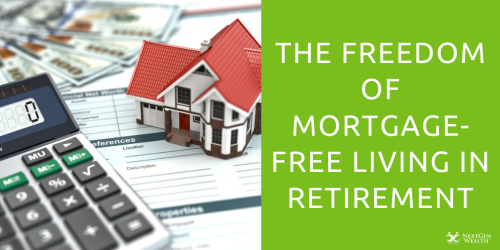The Freedom of Mortgage-Free Living in Retirement
This post was last updated on January 15, 2021, to reflect all updated information and best serve your needs.
When you retire, you deserve to enjoy years of relaxation and stress-free time doing the things that make you happy with the people you love. One of the best ways to make sure this happens is by paying off your mortgage before entering your retirement years. In this article, we’ll show you the freedom that not having a mortgage in retirement brings, and we’ll also tell you how to get there.

Living the Mortgage-Free Life
First off, should you even retire without paying off your mortgage? Columnist Michelle Singletary notes that mortgage payments are the biggest expense that retirees face, and getting rid of this bill means that other important payments can take its place.
Unfortunately, almost half of the Americans who have retired in recent years have been unable to pay their mortgage off before they stop working. However, you don’t have to be part of the statistics, and the benefits of achieving this goal are clear. Plus, the burden of not having a mortgage feels pretty good too.
When you save money on your mortgage you can spend it on other things instead. The most important of these might include health insurance since your policy maybe a little more expensive now that you’ve retired particularly if you’re not eligible for Medicare yet..
You may also spend your hard-earned funds on house upkeep, groceries, vacations, pets, or any new hobbies you choose to pick up. The keyword here is “freedom.” You can spend your money on anything you want when you are retired, although we recommend that you do take a look at your budget when you’re looking through your options.
Also, make sure to keep within a monthly budget to always have a handle on your finances. It’s good to have “fun money,” but if you spend so much in one month that you’re having to choose between buying frozen chicken breasts or paper towels the next, you’re going to want to rethink some things.
How To Pay Your Mortgage Ahead Of Time
To make this dream a reality, you need to do a little prep work. First, look at the budget that you have to work with now.
In your current budget, how much do you spend on your mortgage? What is your balance for utilities, internet, and insurance? You will probably be paying for auto, health, and life insurance, so keep this in mind as you budget. How much have you set aside for groceries and entertainment?
If you have credit card debt, start paying it off now. This should be a priority since this kind of debt has a higher interest rate than a mortgage. You want to prevent paying as much interest as possible over the course of your life.
Determine How Much You Can Pay
Once the necessities are out of the way, look at the remaining funds you have to work with each month. Could you set aside an extra $100 or so each month to pay off a little more of your mortgage?
Depending on your income, this may not be an option for you, but a little will truly go a long way here. The earlier you pay off that mortgage, the less interest you will have to pay to the bank in the long run.
Consider Downsizing
If refinancing or reallocating aren’t great options for you, and you’re planning to relocate anyway, you might want to consider moving into a smaller home. Downsizing may even eliminate the possibility of paying a mortgage at all, depending on where you go and how much you can pay up-front.
You can move to an area with less property tax, or you can stay exactly where you are, but in a smaller home. All kinds of options are open to you, including neighborhoods specifically for retirees.
You may find that you can save money by happily switching to a townhouse or tiny home. This may even be your time to live your dream of full-time RV life or spending your days on a houseboat. Follow your passion--this is your retirement, after all!
Downsizing might lead you to an apartment in a fantastic location, allowing you to pay less in rent than you would have for a mortgage. You also don’t have to pay for any maintenance, since your landlord will take care of it all for you! Plus, renter’s insurance is incredibly inexpensive, with some plans costing as little as $17 a month.
Consider A Roommate
If you don’t have a spouse or partner moving with you, consider looking for a roommate. A companion will defray the living cost even further, with the added bonus that you will not be alone in the space or taking care of it by yourself. You may even find another person who has just retired to move in with, or select a friend with whom you can enjoy retired life.
Or, if your family is excited about the idea, you might be able to move in with your children. Many couples are happy to have Grandma living directly with them, and some families prepare by making a mini house or space in their backyard for their grandparents to maintain their own place. Plus, the grandkids are always nearby!
Speaking with your family before choosing this option would be wise. Some people do not have the space or funds to help in this way, and you don’t want to get a nasty surprise if your family expects free childcare that you are unwilling to give.
Make sure boundaries are set forth and respected before you go to make this switch. After all, this is your retirement, and you are the only one who should choose how you spend it, not your children or anyone else.
Choosing The Right Option For You
Sometimes, people choose not to pay off their mortgage fully beforehand. Here are a few reasons why this choice might happen.
There is a tax deduction for people who are still paying their mortgage after retirement. It may be the largest one available to you. However, we want to stress that this is only a deduction and not a tax credit. A deduction means that less of your income will be taxed, but a credit actually lessens the amount of tax that you pay overall.
If you pay off your mortgage, then you won’t have those bills hanging over your head. It will save you money in the long run, and it is always better to get rid of debt than to try to save a little money on your taxes while still paying it off.
If you simply don’t have enough funds available to fully pay off your mortgage before you retire, avoid spending all of your savings to take care of the balance. You need to be able to enjoy your life instead of having a paid-off home with no groceries in the fridge.
Do You Need That Money Elsewhere?
Some people keep their mortgages because they are concerned about liquidity. Put simply; liquidity means the ease with which you can turn something you have into actual cash.
Investments like mutual funds and stocks can be easily liquidated if you need more money to live on at any point. Homes can be liquidated too, but it’s going to take quite a while longer.
Should You Use Your 401(K)?
It may be tempting to use your 401k to pay off your mortgage. While this may be an option for you, remember that if you withdraw money from your plan before you turn 59.5 or 55, you may have to pay a penalty along with taxes.
If you are comfortable paying more taxes or confident that your budget will hold without needing a large withdrawal from your 401k, this may be a fantastic option for you. Remember that paying off your mortgage will free up your money for other expenses. It will also protect the assets you already have since this eliminates a specific point of debt for most people.
Could Your Rent Your Home To Pay It Off?
Some people may not want to pay off their mortgage if they plan to rent out their home once they retire. They feel that there is no need if renters’ payments will eventually cover their loan amount.
While this may be true, planning ahead and paying off the mortgage will put those payments directly into your hands. You will be making money instead of saving money you would have had to spend otherwise.
Many people are also choosing to convert rooms in their homes into Airbnb hotel spots. While this may be a great way to cover monthly mortgage payments, remember that bookings are not guaranteed.
It is a fantastic option to consider, but we suggest that you do not use it as your only source of income to pay off your mortgage. Keep in mind that this is a great way to earn cash, but continue to save through investments and income in the meantime.
Contact A Financial Advisor
If you want to have your mortgage fully paid off before you retire, you may need a little help to get there. Luckily, that’s where your financial advisor enters the picture. They will work with you to make a plan based on your specific needs and financial situation to help you determine what steps you need to take to get there.
When you’re ready to make a plan or continue your existing journey towards retirement, contact us at NextGen Wealth. Click here to schedule your call. Start planning now to make your life in retirement the best it can be!


